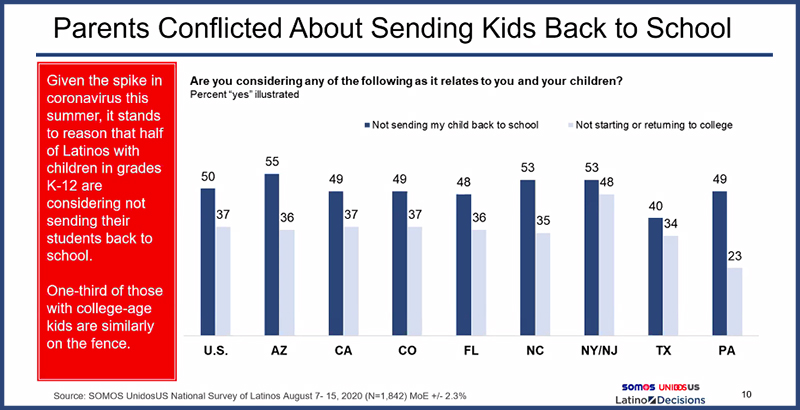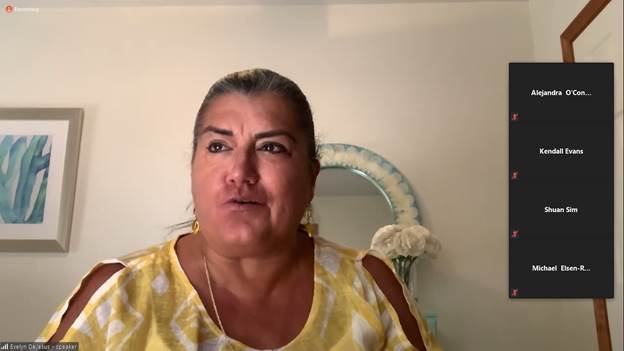New Data Reveal COVID-19’s Harsh Toll on Latino Community; 50% of Latino Parents Say They May Not Send Their Children Back to School

School leaders and doctors met Wednesday to unpack newly released data reflecting the disproportionate destruction COVID-19 continues to wreak upon the Latino community — and to address the implications those numbers hold for New York City’s contentious school reopening plan.
“Latinos have been hospitalized four times as much as people who are white,” said American Federation of Teachers President Randi Weingarten, who participated in the event hosted by SOMOS, a New York-based nonprofit network of health care providers. “What we’re seeing, in terms of the start of school, is the kind of neglect from the top down that is unconscionable: the lack of resources to schools to reopen them safely. All of this could have been solved. This kind of work should have started in April.”
As part of the virtual press conference, Matt Barreto, a co-founder of the polling firm Latino Decisions, presented his group’s new data, which were collected between Aug. 7 and Aug. 15 and surveyed 1,842 respondents, 838 of whom have children ages 17 or younger. Most were from Arizona, California, Colorado, Florida, North Carolina, Pennsylvania, Texas and the New York/New Jersey area.
Among the findings: The Latino community encountered a dramatic wave of cases over the summer; 1 in 10 Latino homes around the country has been hit by the virus; more than half of Latino homes have lost income as a result of the pandemic; more than 1 in 3 Latino parents are currently out of work.
“Given the spike in coronavirus this summer, it stands to reason that half of Latinos with children in grades K-12 are considering not sending their students back to school,” the researchers said. Their data show that 85 percent of survey participants reported anxieties about their children being exposed to the virus at school this fall. Of that group, 59 percent said that the possibility made them “very concerned.”
Those trends hold true in New York City, where a fierce debate rages over how and when to reopen the nation’s largest school system, and where roughly 40 percent of students are Hispanic. Also on hand for Wednesday’s event was Michael Mulgrew, president of New York City’s United Federation of Teachers; the UFT’s vice president for education, Evelyn DeJesus; Servia Silva, the union’s representative responsible for some 30-plus schools in East Harlem’s Community School District 4, an area with a high rate of COVID-19 infections; and Moses Ojeda, principal of Thomas A. Edison Career & Technical Education High School in Queens.
Ojeda said that recently, families have been asking him questions about the reopening that he isn’t equipped to answer.
“They trust in the leader to make the right decisions,” he said. “And it’s hard for me to lead a school without answers. It’s even harder when I think about what we went through [in the spring], and that we might potentially be there again … We’re about to go back to the front line, and we need to make sure we’re ready.”
The Latino Decisions survey results show that 59 percent of Latino households in New York and New Jersey have experienced job loss or a pay cut or have closed a business due to the pandemic, and just over half of respondents there said they are considering not sending their child back to school this fall.
That decision comes with serious complications. Respondents expressed concerns about the possibility of their children falling behind this fall and, in the case of those whose kids have special needs, anxiety about losing access to specialized services. Many are worried that remote learning could mean their kids will have to forgo free meal programs provided through school.
Respondents also addressed barriers to remote learning: More than a third said they didn’t have anyone to stay home with their child, 34 percent said they didn’t have Wi-Fi, and 38 percent said they didn’t have enough devices at home.
The data did supply some potential solutions for districts, including New York City. Parents said administrators and teachers could help them out by communicating more about expectations, assignments and performance. Some 61 percent said that distributing more resources in Spanish would help their children. Overall, the survey reflected parent interest in a gradual reopening of schools, based on advice from teachers, scientists and health experts.
That sentiment was echoed by DeJesus, who holds executive positions in both the AFT and the UFT and helped assemble the New York City teachers union’s school reopening plan. She closed the meeting on a personal note. Back in March, the former early childhood teacher said, she caught the virus. DeJesus ended up with a stroke and, later, Bell’s palsy.

“I speak as a survivor working 18 hours to make sure our schools get what they need,” she said. “My husband got [COVID]. I lost my mom. We want our schools open. All our teachers, and all the members, the nurses, the SOMOS community. We’re all together in this. The mayor is not.”
Neither Mayor Bill de Blasio’s office nor the Department of Education responded to requests for comment. Their official position remains that a Sept. 10 reopening is best for the city, despite widespread concern over whether the system is equipped for a safe hybrid model that will supply in-person and remote learning to NYC’s 1.1 million students.
On Monday, the mayor invited principals to submit outdoor learning plans. On Tuesday, he promised to send engineers to check ventilation in tens of thousands of classrooms across the city. But critics of the mayor’s process say that it’s too little too late — and they question the feasibility of implementing the necessary protocols on a tight budget, just two weeks before school is scheduled to start.
“The goal is to get schools open — [to give] our parents the information that equity is on the horizon,” said DeJesus. “That is not the case here.”
Get stories like these delivered straight to your inbox. Sign up for The 74 Newsletter

;)
